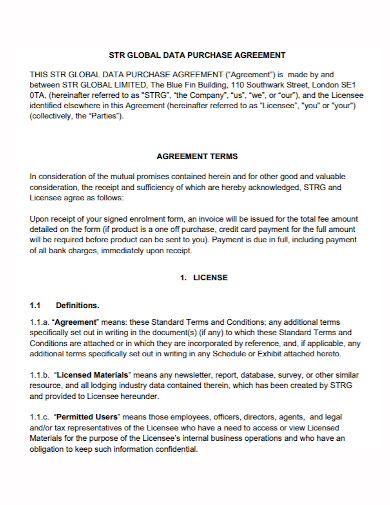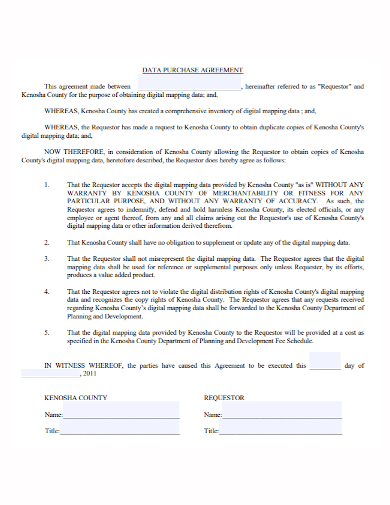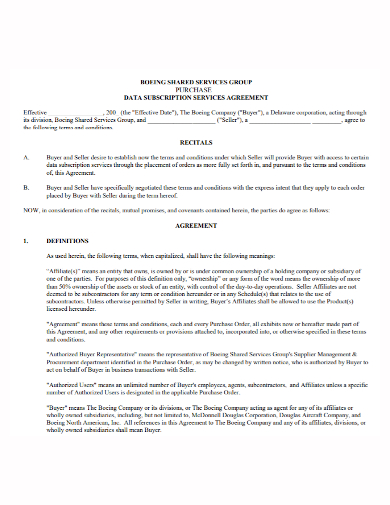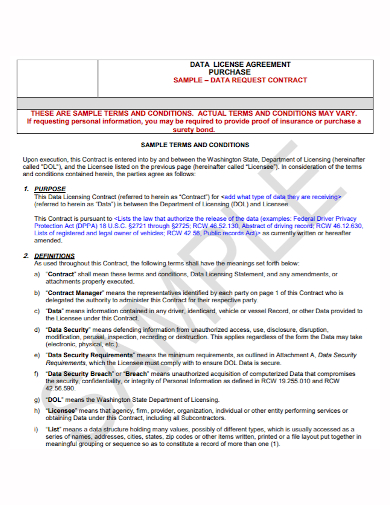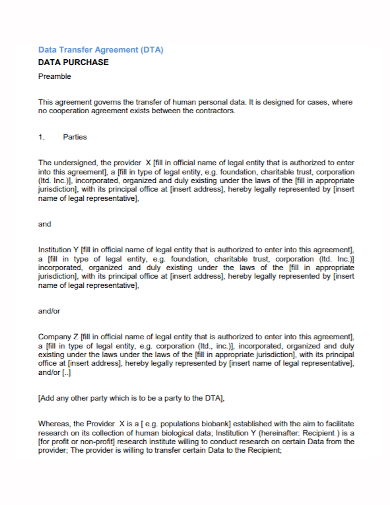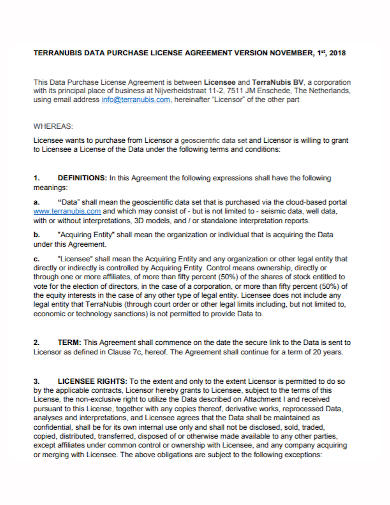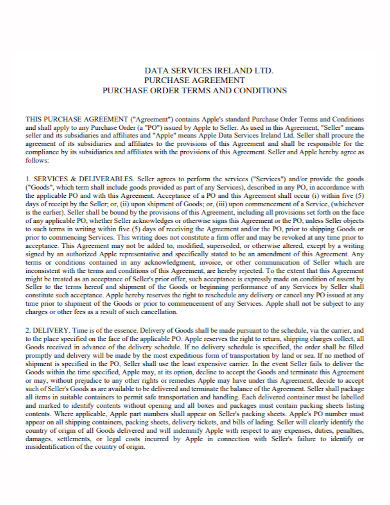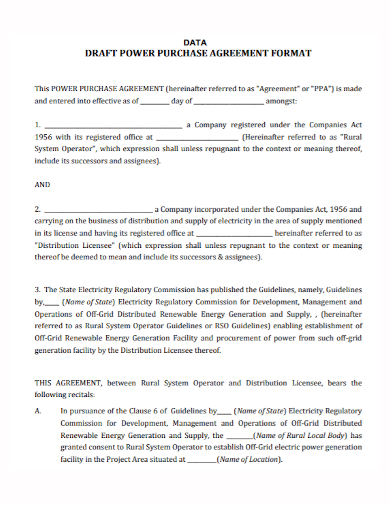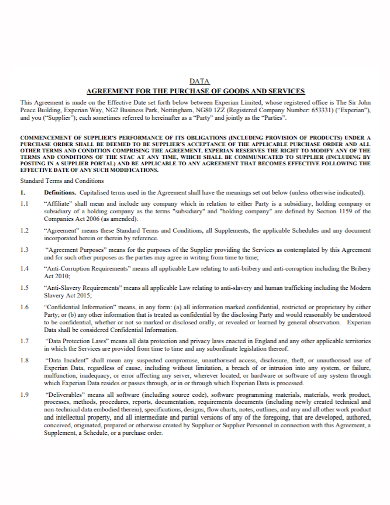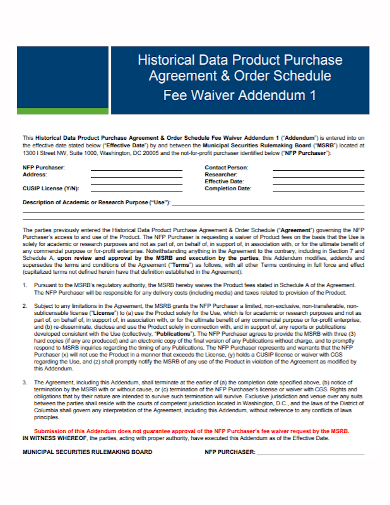Whether you’re targeting consumers or businesses with your mailing campaign, finding the right company to buy data from is critical. The best data will be opt-in and gathered from previous sales inquiries. This indicates that the prospect has previously expressed interest in a similar product or service and has agreed to be contacted about similar products or services in the future. The data you buy should ideally have been collected recently, but if it hasn’t, the provider should have double-checked it on a regular basis to ensure that it is still accurate.
10+ Data Purchase Agreement Samples
Data purchasing is an important part of your direct mail marketing strategy because it involves purchasing marketing data from a third-party data provider rather than compiling figures yourself. This information enables a company to send targeted marketing materials to customers it has never met before, increasing brand awareness and generating new sales leads.
1. Data Purchase Agreement Template
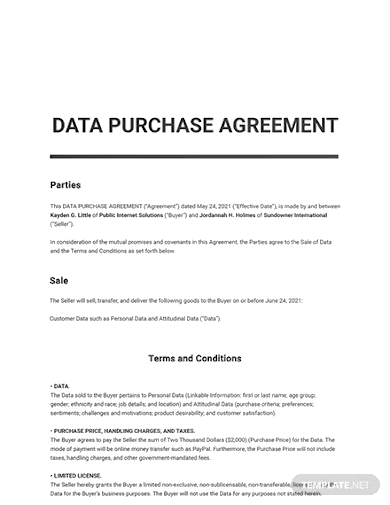
2. Data License Purchase Agreement
3. Data Purchase Agreement
4. Data Purchase Subscription Agreement
5. Data License Purchase Contract Agreement
6. Data Transfer Purchase Agreement
7. Sample Data Purchase Agreement
8. Data Services Purchase Agreement
9. Data Power Purchase Agreement
10. Data Purchase Goods and Services Agreement
11. Data Product Purchase Agreement
Understanding Data Purchasing
- Make sure your B2B data provider understands your business and goals – Do you need to regularly update and append in-house lists to ensure accuracy and completeness, or are you looking to rent a list for a one-time mailing? A reputable data provider will take the time to thoroughly examine your company’s requirements. They’ll draft a contract that addresses both your immediate and long-term data needs. Make a list of your specifications and share it with each vendor. Once you’ve been presented with a contract, read it thoroughly before signing it to ensure that it meets your requirements.
- Determine the services your price includes – Make sure you know exactly what you’re getting for your money. A low cost per record is frequently advertised by vendors to entice buyers. This will only cover the “basic” package, which the buyer is unaware of. The vendor will tack on extra charges for additional selects, fields, or multiple users after the deal is made. Check your contract’s fine print and don’t be afraid to ask questions. Speak up if something doesn’t make sense or isn’t obvious. Examine your contract for any hidden costs or restrictions, such as minimum purchase requirements, data expiration, setup fees, or rush fees.
- Pay for the data you actually need – It’s pointless to spend money on data that your company will never use. Ask the data provider if they have a method for running their dataset against an existing customer/prospect list or a suppression file before you buy. This method will reveal records that aren’t worth your company’s time and money, such as duplicate and incomplete fields. This will usually come at an additional cost, but it will save your company money in the long run.
- Scrutinize the vendor’s customer service policies – Reliable data providers will frequently compensate you in some way if the data you receive does not meet their accuracy and deliverability guarantees. Find out if the dataset you’re buying is covered by these guarantees and what you’ll need to prove a record is a duplicate, undeliverable, or incorrect. Agree on how you’ll be compensated ahead of time.
- Ask for a discount – Volume (or long-term contract) discounts, pre-payment discounts, new customer discounts, bundled offers, and reduced rates on net new records after your first purchase are all examples of discounts. Look into the vendor’s other products as well; they might be willing to give you a free trial or a discount on one or more of them in exchange for your business.
FAQs
What is direct mail marketing?
Direct Mail Marketing is a tried-and-true method for increasing sales and brand awareness, but any successful campaign requires the right data, which can be difficult to come by for those without prior experience.
What is marketing data?
Marketing data is the information used by marketers to create advertising materials that are as personalized and appealing as possible. Because it is impossible to write personalized messages to each of your clients, data can be used to create marketing strategies that reflect client demographics to the extent that they will appeal to them in broad terms, based on information about the group as a whole.
However, if your previous data marketing has proven to be successful, it may be worthwhile to scale up the process, particularly if your operations have been able to expand as a result of the new clients brought in by your marketing. Whether or not it’s time to buy more data depends entirely on your objectives, processes, and outcomes. If you keep track of your progress and keep track of the costs of your campaigns, you should be in a good position to buy more data when the time comes.
Related Posts
FREE 10+ Mentoring Agreement Samples In MS Word | Apple Pages | PDF
FREE 10+ Partner Agreement Samples In MS Word | Google Docs | Apple Pages | PDF
FREE 10+ Individual Agreement Samples In MS Word | Google Docs | Apple Pages | PDF
FREE 10+ Strategic Agreement Samples In MS Word | Google Docs | Apple Pages | PDF
FREE 10+ Equity Agreement Samples In MS Word | Google Docs | Apple Pages | PDF
FREE 10+ Producer Agreement Samples in MS Word | Apple Pages | PDF
FREE 10+ Grant Agreement Samples In MS Word | Apple Pages | PDF
FREE 8+ Meeting Agreement Samples in MS Word | Google Docs | Apple Pages | PDF
FREE 10+ Community Agreement Samples In MS Word | Google Docs | PDF
FREE 8+ Real Estate Option Agreement Samples in MS Word | PDF
FREE 10+ Call Option Agreement Samples In MS Word | PDF
FREE 10+ Advertising Agreement Samples In MS Word | Google Docs | Apple Pages | PDF
FREE 10+ Car Agreement Samples In MS Word | Google Docs | Apple Pages | PDF
FREE 10+ Horse Agreement Samples In MS Word | Apple Pages | PDF
FREE 10+ Option Agreement Samples In MS Word | Google Docs | Apple Pages | PDF

